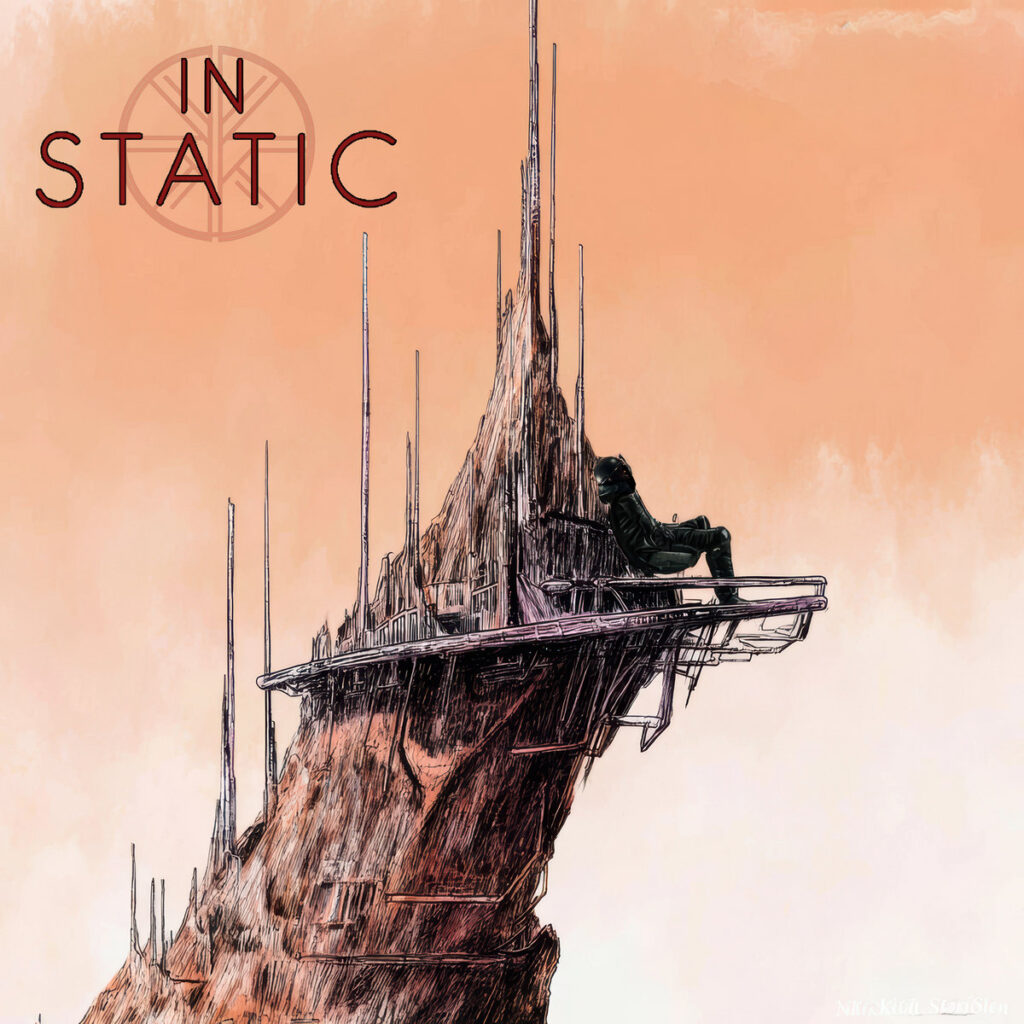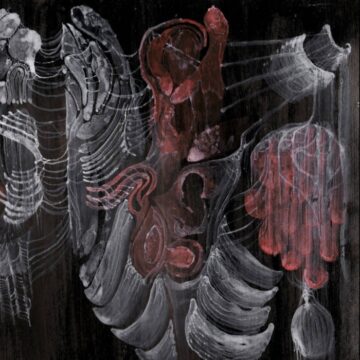Review: In Static – In Static

Artwork by: A robot
Style: Djent, Metalcore, Progressive Metal (Mixed Vocals)
Recommended for fans of: Meshuggah, Mastodon, Tool, Thornhill
Country: United States (North Carolina)
Release date: 5 September 2025
The Terminator franchise gets the big spotlight for highlighting the nightmarish danger of AI via SkyNet, a military defense system that unleashes nuclear Armageddon upon its creators after achieving sentience. But there’s another franchise I think predicted the rise of AI more accurately—as the sinister, nigh-invisible virus infecting everything around us until what’s real and what’s machine becomes irrevocably blurred. That would be Metal Gear Solid, which across several games unveiled the Patriots, a massive AI network that secretly ran the economy, could deepfake people, alter others’ perception of reality, and even control soldiers through networked nano machines. Not as overt a warning as “wiping out all humans,” maybe, and still entrenched in dense layers of science fiction—but revisiting the games in 2025, where “AI” is being pushed left and right in everything from sorting job candidates, search engines, companionship, to infringing on Humanity’s creativity, Hideo Kojima’s visionary tactical espionage actioners feel alarmingly more prescient than James Cameron’s killer robot time-travel blockbusters.
This brings us to In Static, a progressive / djent / metalcore band hailing from North Carolina. Pulling from the cult theatrics of bands like Sleep Token, Slipknot, and Mushroomhead, the members are known as simply The Signal, Balance, Apex, Fracture, and Archivist, robed in black and veiled in esoteric symbols. They refer to themselves not as a band, but an order, wherein they fuse “hypnotic polyrhythms, crushing grooves, dissonant textures, and fractured ambience.” In laymen’s terms: they play a mix of progressive metalcore and skronky djent. Theirs is a hodgepodge of familiar elements, compressed and distilled across nine tracks, culminating in fifty-one minutes of crunchy sci-fi-themed metal. The question then becomes, does their debut In Static position the eponymous act to join the ranks of similarly masked royalty? Or will In Static’s proximity to familiar sounds leave them mired in the lower worlds, never to know the sweet taste of metal divinity?
In Static’s jagged breed of metalcore synthesizes various discernible influences, from Mastodon-like vocals and roiling kitwork a’la Emperor of Sand (“The Mother of Invention”), Meshuggah-core riffs that thrust and punch like an industrialized nightmare given life (“The Geometry of Hunger,” “Fading Signals”), and throughout, post-Heroine Thornhill texturing and ambience (“Surrender”) opening the way for emotive and rousing metalcore cleans and tastily-placed harshes. Even Tool’s flavor of bendy, tribal prog pops up in closer “The Throat of the Void Whale.” The singer (Signal? Apex? Who can tell?) possesses a perfect delivery system for this kind of material; generally limited in range (no falsettos here) but all the more powerful for operating within acceptable levels. He roars, bellows, and croons, never straying far from a mid-range foundation but hitting all the right marks that define winsome metalcore moments. The choruses are almost universally catchy in that way where you feel as though you’ve sung them a thousand times. He attacks every track with confidence, wielding melody like a blade to cut through even the densest thickets of polyrhythmic riffage. Even on more wandering tracks like the stoner-rock attuned “Echoes of the Hollow Crown,” his timbre and performance align themselves well with the stylistic shifts. Kudos to him and his efforts.
However, there’s one glaring problem with In Static and their debut.
They aren’t real.
That’s right. Just like Raiden in Metal Gear Solid 2, I was torn from a sordid virtual dream and nearly crippled by the horrid reality confronting me. In Static (perhaps sans the vocalist) is an AI construct, developed by entity The Music Labs, which boasts a roster of “bands” spanning metal, punk, DnB, et cetera. Each act is given their own “personality” and history. In Music Labs’ own words: “AI is used in making this music, as well as other new and interesting technologies to create music for all to enjoy.”1 They also state that “Humans are very much still part of the songwriting, structure, and instrumental composition,” but now the question becomes: In what capacity? Were ideas brainstormed via AI prompting, then taken to be iterated and evolved upon by a human being either playing an actual instrument or composing via some form of music software?2 Suddenly, the mystery at the heart of In Static shifted from “who are these people?” to “are any of them people?” And with it, my opinion on this “debut”—the work of a farcical band, part of a roster of puppet acts generated by machine “intelligence”—has been sundered most tragically. How am I to critique such a work, when the “performers” are in fact processes and algorithms fed with and acting upon information by people who, presumably, lack the fortitude to simply write this music themselves? I suppose I could tell the prompters to tweak their inputs, such as “Hey, maybe next time make the album sound more cohesive” or “adjust the production so all the instruments don’t sound blatantly programmed,” but that would honestly serve no one. Perhaps if The Music Labs was less vague about its process, and disclosed how deeply humans were involved in the construction / composition / writing of this music, I would feel more comfortable engaging with the work.
If AI was used as some sort of production assistant to speed up tedious tasks, I could understand that. But the very thought of someone using AI to sidestep what is inarguably the most important part of creativity—the (often long and arduous) process wherein our ideas and concepts take root through the stroke of a brush, an uncertain pluck of a guitar string, that first hesitant keyboard tap as we stare at a blank manuscript page—is not only disquieting to me, but revolting. Such flippant disregard for an entire history of Human expression, this transmogrification of the beauty of art into just another soulless grift to be peddled by grinning vultures… How in good faith can I engage with such engines of miscreation?
I know there are plenty out there who will see this and say I’m overreacting, or refusing to get with the times. “AI is the future, bro,” says everyone whose stock portfolio depends on it being so. “It’s still a human being entering the prompts.” I don’t care. AI has plenty of meaningful uses elsewhere. Music isn’t one of them. Generative AI is tantamount to theft, feeding off of copyrighted work without permission like a parasite—something Nick Clegg, former president of global affairs at Meta, gallingly defended. In Static and their debut may have humans involved somewhere, but if none of that involved playing or composing any actual music, then they may as well have committed plagiarism. The scariest part was how convincing the ruse was. One day, who knows? Maybe all our musicians will have been harvested to feed the great AI machines of Tomorrow, and we’ll all be listening to stuff like In Static—serviceable listening material, even winsome at times, but dreadfully lacking in soul, identity, and integrity.
Recommended tracks: The Mother of Invention, The Geometry of Hunger, Echoes of the Hollow Crown
You may also like: Real music by real musicians, The Defect, Nemertines
Final verdict: 1/10
Related links: Bandcamp
Label: The Music Labs – Bandcamp
In Static is:
– The Signal (pulse)
– The Balance (dissonance)
– The Apex (transmission)
– The Fracture (echo)
– The Archivist (resonance)
With guests:
– The AI that actually did the bulk of the work.



0 Comments